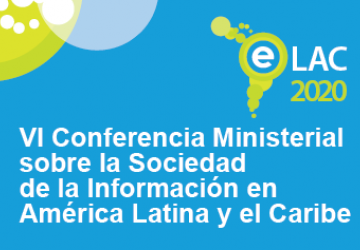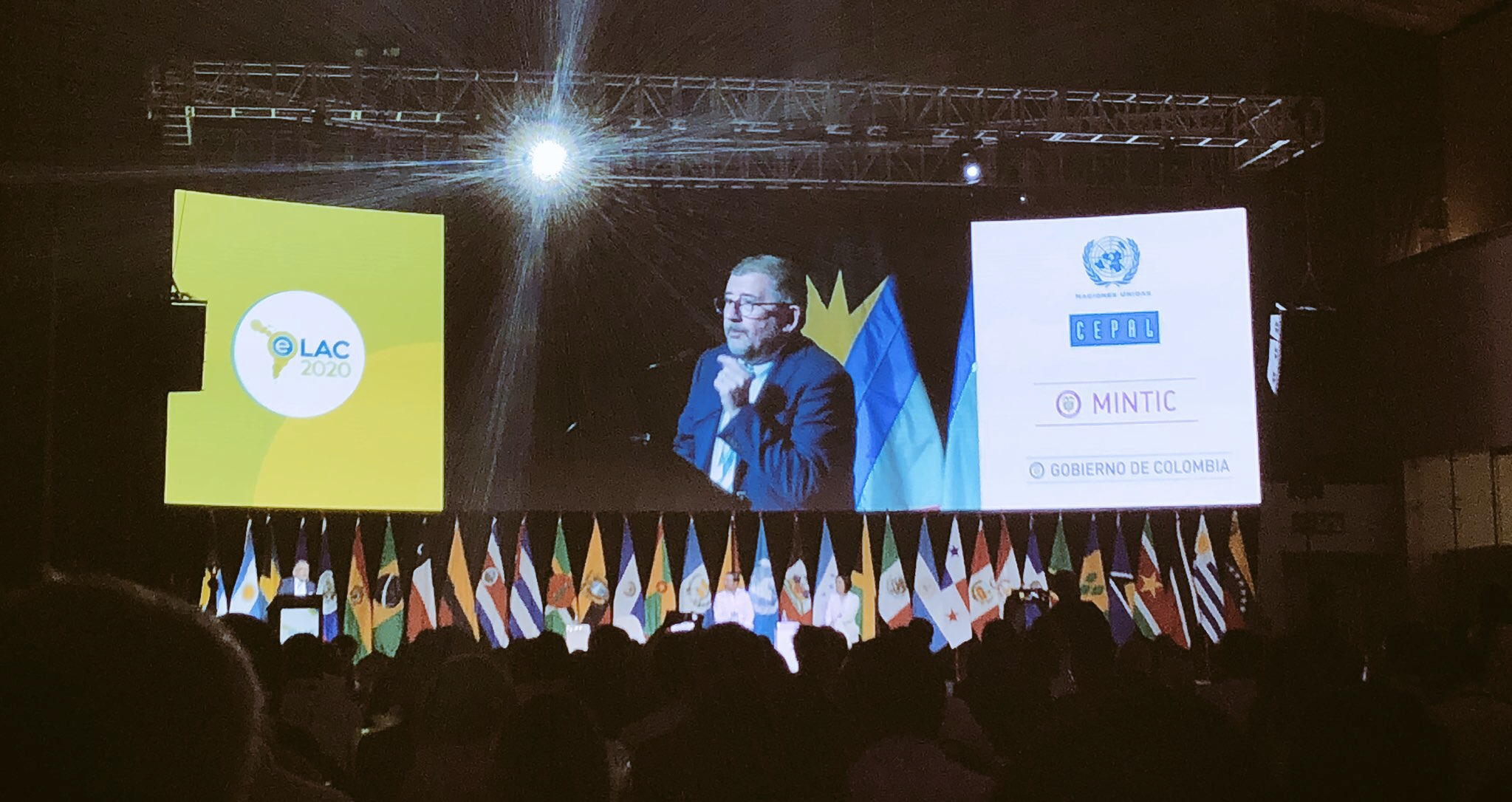18
Apr 2018
I&J Secretariat Participates in ECLAC Ministerial Conference on the Information Society in Colombia
I&J contributed
March 13, 2018
The United Nation's Economic Commission for Latin America and the Caribbean (ECLAC) and the Government of Colombia invited the Secretariat of the Internet & Jurisdiction Policy Network to participate in the Sixth Ministerial Conference on the Information Society in Latin America and the Caribbean, which took place on April 18-20, 2018 in Cartagena de Indias, Colombia.

The Conference was an important opportunity for Deputy Director Paul Fehlinger to present to key actors in the region the outcomes of the second Global Conference of the Internet & Jurisdiction Policy Network, which took place in Ottawa, Canada in February 2018.
The purpose of the Ministerial Conference was to renew the digital agenda for Latin America and the Caribbean (eLAC) towards 2020 in order to strengthen the digital development and the processes integration and cooperation through a platform of high-level political dialogue.

Background Information
The Economic and Social Council of the United Nations decided in 1999 that the high-level meetings of the 2000 session would be devoted to consideration of the subject "Development and international cooperation in the twenty-first century: the role of information technology in the context of a knowledge-based global economy". Accordingly, in July 2000, the countries of Latin America and the Caribbean, convened by the Government of Brazil and ECLAC, adopted the Declaration of Florianopolis on the use of information and communications technologies (ICT) for development. The World Summit on the Information Society (WSIS), which was held in two phases (Geneva in 2003 and Tunis in 2005), the region's authorities intensified their efforts to build a regional perspective on the development of information societies. At meetings held between 2001 and 2003, the regional network of the United Nations Information and Communication Technologies Task Force placed great emphasis on the importance of collaboration among stakeholders in addressing this challenge. Simultaneously, the Agenda for Connectivity in the Americas and the Plan of Action of Quito (August 2002) emphasized the need to develop realistic programmes of action and national strategies.
The Bávaro Declaration of 2003 was an important step towards establishing the fundamental principles for the transition towards information societies in Latin America and the Caribbean, helping to identify its key features in the region. After the adoption of the Bávaro Declaration, analysis of Internet governance and open-source software was included in the WSIS process for the first time, and these topics took on great importance during the Summit and subsequent events.
In 2005, at the preparatory meetings for the second phase of WSIS and during the Regional Preparatory Ministerial Conference of Latin America and the Caribbean, and after several years of discussion on the relationship between ICTs, growth and equity, the region adopted the Rio de Janeiro Commitment and the Plan of Action for the Information Society in Latin America and the Caribbean, known as eLAC2007.
The second step was taken in 2008, in El Salvador, with the adoption of the second Plan of Action, eLAC2010; and the third took place with the adoption of eLAC2015, in Lima in 2010. This process continued in April 2013 with the Fourth Ministerial Conference on the Information Society in Latin America and the Caribbean, held in Montevideo, which adopted the Montevideo Declaration and the Plan of Work 2013-2015.
At the Fifth Ministerial Conference on the Information Society in Latin America and the Caribbean, which took place from 5 to 7 August 2015 in Mexico City, the countries adopted the Mexico City Declaration and the Digital Agenda for Latin America and the Caribbean (eLAC2018), and agreed to hold the Sixth Ministerial Conference on the Information Society in Latin America and the Caribbean in Colombia in 2018, in order to continue this cooperation modality, renew commitments beyond 2018 and bring into the discussion the challenges emerging from the digital revolution and consideration of the 2030 Agenda for Sustainable Development.
The United Nation's Economic Commission for Latin America and the Caribbean (ECLAC) and the Government of Colombia invited the Secretariat of the Internet & Jurisdiction Policy Network to participate in the Sixth Ministerial Conference on the Information Society in Latin America and the Caribbean, which took place on April 18-20, 2018 in Cartagena de Indias, Colombia.

The Conference was an important opportunity for Deputy Director Paul Fehlinger to present to key actors in the region the outcomes of the second Global Conference of the Internet & Jurisdiction Policy Network, which took place in Ottawa, Canada in February 2018.
The purpose of the Ministerial Conference was to renew the digital agenda for Latin America and the Caribbean (eLAC) towards 2020 in order to strengthen the digital development and the processes integration and cooperation through a platform of high-level political dialogue.

Background Information
The Economic and Social Council of the United Nations decided in 1999 that the high-level meetings of the 2000 session would be devoted to consideration of the subject "Development and international cooperation in the twenty-first century: the role of information technology in the context of a knowledge-based global economy". Accordingly, in July 2000, the countries of Latin America and the Caribbean, convened by the Government of Brazil and ECLAC, adopted the Declaration of Florianopolis on the use of information and communications technologies (ICT) for development. The World Summit on the Information Society (WSIS), which was held in two phases (Geneva in 2003 and Tunis in 2005), the region's authorities intensified their efforts to build a regional perspective on the development of information societies. At meetings held between 2001 and 2003, the regional network of the United Nations Information and Communication Technologies Task Force placed great emphasis on the importance of collaboration among stakeholders in addressing this challenge. Simultaneously, the Agenda for Connectivity in the Americas and the Plan of Action of Quito (August 2002) emphasized the need to develop realistic programmes of action and national strategies.
The Bávaro Declaration of 2003 was an important step towards establishing the fundamental principles for the transition towards information societies in Latin America and the Caribbean, helping to identify its key features in the region. After the adoption of the Bávaro Declaration, analysis of Internet governance and open-source software was included in the WSIS process for the first time, and these topics took on great importance during the Summit and subsequent events.
In 2005, at the preparatory meetings for the second phase of WSIS and during the Regional Preparatory Ministerial Conference of Latin America and the Caribbean, and after several years of discussion on the relationship between ICTs, growth and equity, the region adopted the Rio de Janeiro Commitment and the Plan of Action for the Information Society in Latin America and the Caribbean, known as eLAC2007.
The second step was taken in 2008, in El Salvador, with the adoption of the second Plan of Action, eLAC2010; and the third took place with the adoption of eLAC2015, in Lima in 2010. This process continued in April 2013 with the Fourth Ministerial Conference on the Information Society in Latin America and the Caribbean, held in Montevideo, which adopted the Montevideo Declaration and the Plan of Work 2013-2015.
At the Fifth Ministerial Conference on the Information Society in Latin America and the Caribbean, which took place from 5 to 7 August 2015 in Mexico City, the countries adopted the Mexico City Declaration and the Digital Agenda for Latin America and the Caribbean (eLAC2018), and agreed to hold the Sixth Ministerial Conference on the Information Society in Latin America and the Caribbean in Colombia in 2018, in order to continue this cooperation modality, renew commitments beyond 2018 and bring into the discussion the challenges emerging from the digital revolution and consideration of the 2030 Agenda for Sustainable Development.


